Interstate Asphalt Powers Up Updated Plant
BY Sandy Lender
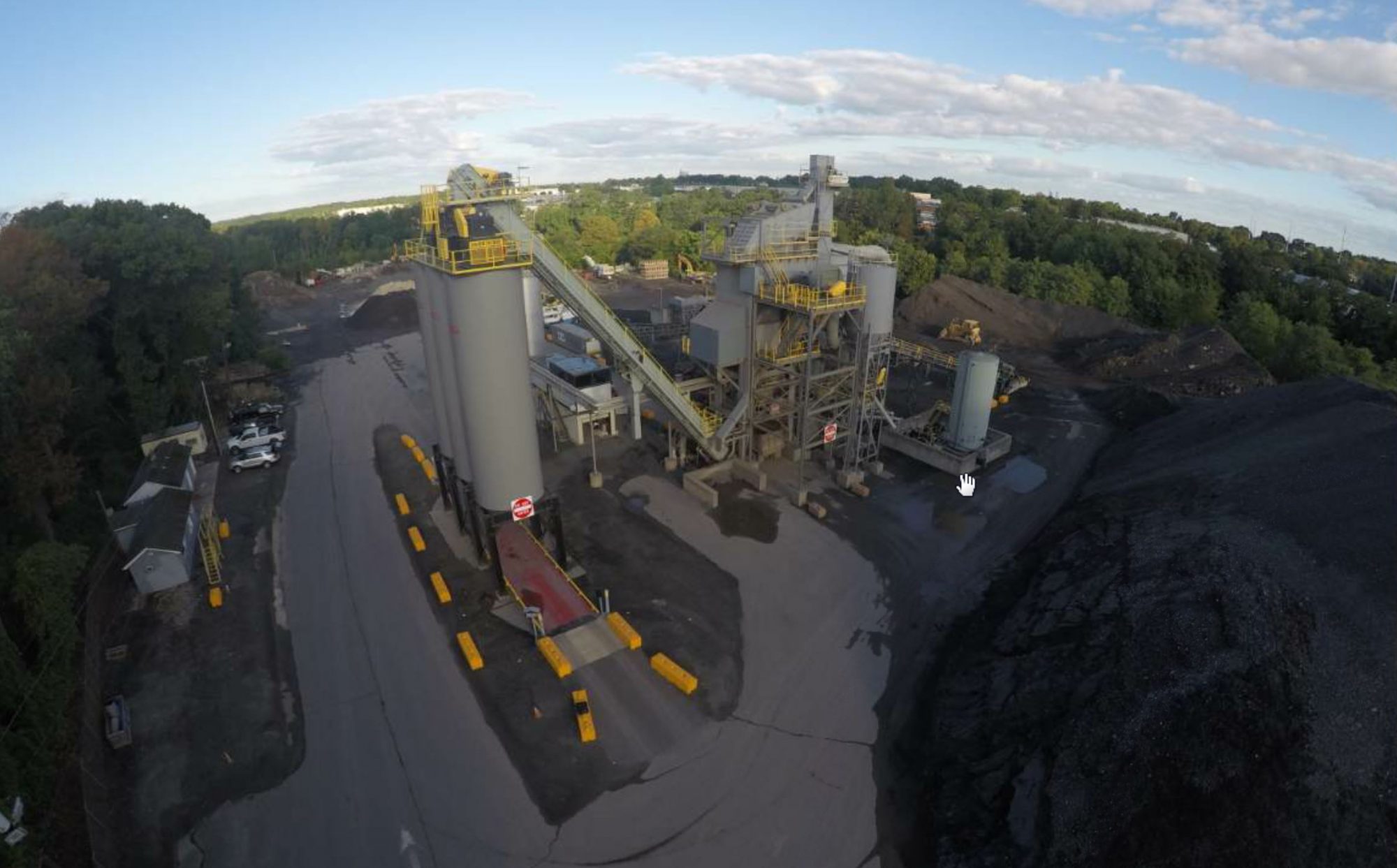
When Trap Rock Industries closed its McCarter batch plant in Runnemede, New Jersey, in 2008, a local Southern New Jersey/Pennsylvania area contractor took a closer look at how they might use the site to benefit business. Thus Interstate Asphalt Products was born and the family owned construction team purchased the plant, incorporated some improvements, and opened for business in 2016. Steven Renzi, the sales director at Interstate Asphalt, discussed how they collaborated with Meeker Equipment Inc., Belleville, Pennsylvania, on a five-year plan to update the older plant and how the whole team at Interstate brings a positive atmosphere to the operations.
When they opened the plant in 2016, Interstate put a seasoned operator in place.
“The plant operator worked for Trap Rock for about 20 plus years, so he knew the plant inside and out, and came to work with us,” Renzi said. “We had a good starting point and template to build on. Then I sat down with one of the partners and Jeff Meeker to review various upgrades and options. We relied heavily on Jeff’s experience.”
“The plant sat for five years or so prior to Interstate purchasing it,” Jeff Meeker said. “Meeker Equipment had originally supplied this plant to the former owner. The batch plant brand is a McCarter plant, which my family has considerable experience with as my father worked for McCarter for many years. I was asked to meet the family owned construction team to go over what the plant needed to be competitive in the marketplace. The plant needed a general overhaul. Motors and gearboxes needed to be checked. Rotting belts needed to be replaced. Basically, the plant needed general maintenance. The Interstate team quickly got the plant up to speed.” Meeker saw their need to add recycled asphalt pavement (RAP).
“The RAP could get us an immediate return on investment so he suggested we start with that,” Renzi said. “Once we got the new RAP System installed, we started to see some savings in operations and plant efficiency.”
Renzi explained that steam and dust were an issue on the outdated system, which allowed up to 20 percent max capacity RAP, “so Jeff and his team designed and installed a new RAP-PAK system including the tower and the blower,” in 2017.
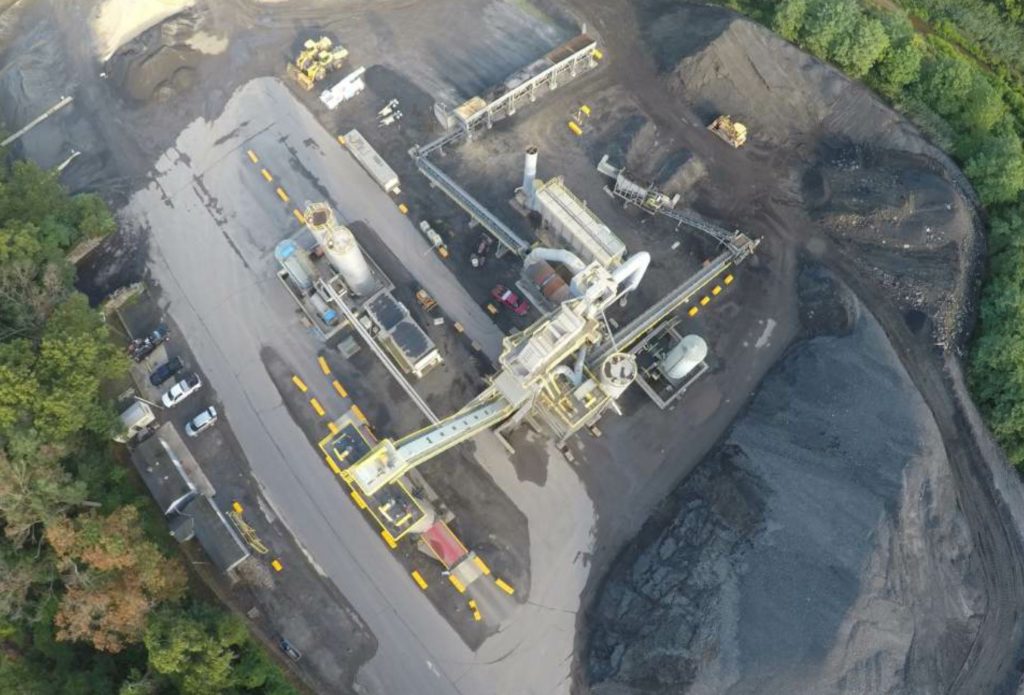
Interstate Asphalt Products collaborated with Meeker Equipment Inc., Belleville, Pennsylvania, on a five-year plan to update an older plant with the whole team at Interstate bringing a positive atmosphere to the operation. Photos courtesy Meeker Equipment
Meeker explained how outdated RAP introduction for batch operations used to cause steam emissions problems and leave batch operations in our industry with a competitive disadvantage:
“Various forms of batch plants have been used in the asphalt market for over 100 years. For most of those 100 years, batch plants operated using 100 percent virgin materials. The batch plants were designed around using 100 percent virgin materials and there really wasn’t any consideration for running RAP in those plants.
“In the 1970s, the drum mix plant started to make real inroads into the asphalt market,” Meeker continued. “The drum plants started operating with RAP and those plants had a competitive advantage over the traditional batch plants. In the 1970s, batch plants started using various forms to add RAP into the mixtures. One method was to add RAP into the aggregate weigh hopper on the batch tower. Basically, RAP was added with a long conveyor to the weigh hopper. It was added like any other aggregate. It was weighed just like weighing up sand or stone. When the hot aggregates and cold RAP were dropped into the mixer and liquid AC was added, there was a steam explosion. The steam was created from the immediate release of water from the RAP. Steam would come out seals or cracks in the mixer, causing fugitive issues.
“The manufacturers understood the issue, so large ducts were added to the mixer to allow for the release of steam to the baghouse. When doing that, another problem occurred. Plant production suffered. By adding the large ductwork back to the baghouse, the ductwork in essence short circuited the burner/dryer/baghouse air system. Every time a batch occurred, a damper opened to the mixer allowing the steam to release from the mixer. The steam went to the baghouse but in that brief period of time the damper was open, the burner did not receive proper air for combustion. To the burner, air was removed momentarily thus causing the burner to lose efficiency. By losing flame temperature, the plant operator had to “slow” the aggregate feeds to the plant down causing overall plant production to slow. Batch plants running RAP slowed production down considerably, thus minimizing the benefit of the RAP. Plants could add RAP but couldn’t get the production they needed.
“Over the years, other methods of adding RAP to batch plants have been tried,” Meeker continued. “One method was to add RAP to the hot elevator and blend the RAP in with the virgin aggregate as it exited the dryer. Comingled RAP and virgin aggregate traveled up the hot elevator and passed across the screen deck. The advantage to this method was the steam explosion never occurred in the mixer, but the downside to this was batch tower screens were getting blinded. If the RAP got too hot going up the elevator, the liquid AC in the RAP would activate, causing the material to get sticky. The sticky RAP would get stuck on the screen cloth, causing the opening in the cloth to close, thus reducing the quality of screening on the aggregates.”
To get the Runnemede plant up to date with RAP use and good production, Meeker built a new system for Interstate and contacted Ken Cardy of Libra Systems Inc., Harleysville, Pennsylvania, to get new controls in place. About 10 years ago, Meeker engineers developed the Meeker RAP PAK system, starting with a separate weigh hopper just for the RAP, but still allowing RAP to be weighed at the same time as other materials.
“By doing this, the automation companies could weigh up the RAP separately from other virgin aggregates,” Meeker explained. “In other words, the RAP and virgin aggregates weighed up on the scales simultaneously, thus saving precious seconds. In the Meeker RAP PAK system, the RAP is weighed at the same time as the virgin aggregate and the liquid AC.”
Next, the system discharges the RAP into the mixer in small batches.
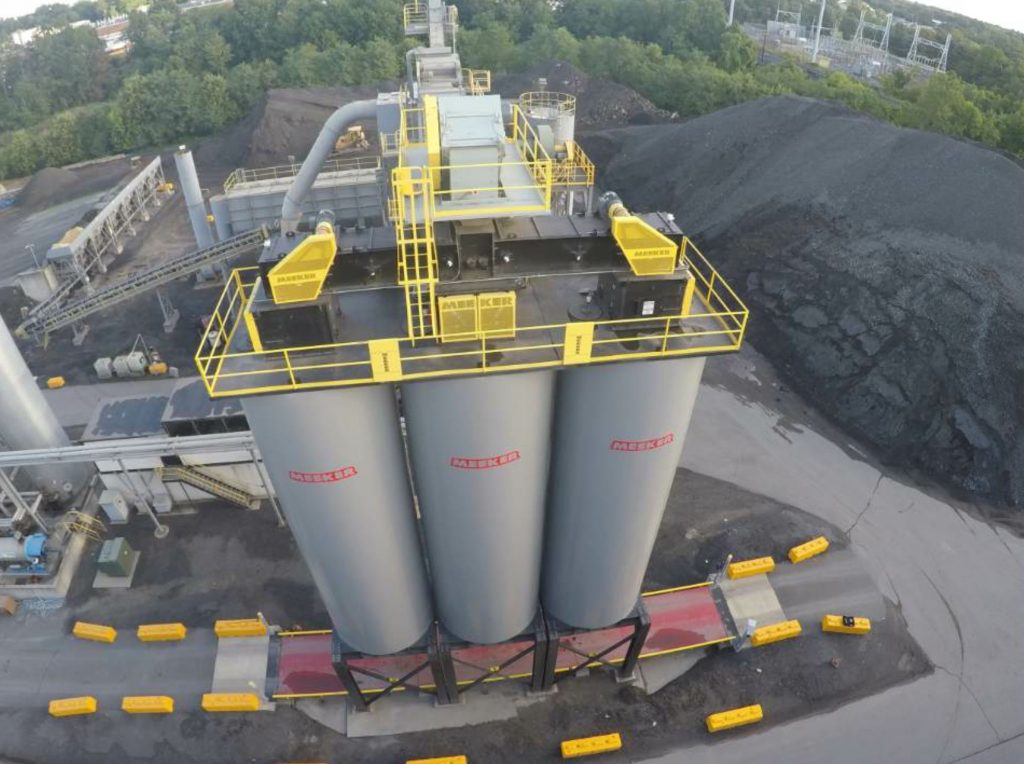
Now that Interstate Asphalt has three 250-ton silos in place, they can service bigger jobs and handle multiple clients with a flexibility they didn’t have before.
“In other words, the RAP is chattered into the mixer thus delivering only small amounts of RAP,” Meeker explained. “By spreading out the time it takes to add the RAP, the steam is emitted in smaller quantities. By the time the liquid AC is added, a lot of the steam has been removed already.”
Finally, the system features Meeker’s exclusive dual damper system. “The dual damper system is designed to remove the steam from the mixer with a variable frequency drive exhaust fan and deliver the steam to the front of the dryer, like we see on many drum mix plants today,” Meeker explained. “The steam enters the air system naturally and doesn’t affect the burner/dryer/baghouse air system because the fan is keeping constant air pressure on the dryer.”
Depending upon the plant manufacturer, the system is capable of doing 30 to 40 percent RAP in a batch plant, Meeker explained. Renzi shared that, with the new AC bucket and new platform Meeker added to the RAP PAK system, Interstate’s plant is now capable of 35 to 40 percent RAP in base mixes. They tend to run up to 25 percent RAP for surface course mixes.
Moving between mixes and percentages is made easier with a new controls system, too. Libra’s Cardy explained that developing the plan for the controls was a collaboration with Meeker. “Libra entered the process in October 2016, soon after the plant was acquired from the previous owner,” Cardy said.
“We had an older/outdated control system, so we needed to update that,” Renzi said. He explained that they “installed the Libra Gen3 controls in anticipation of the new silo setup, so when the silos came in, we were set.”
Local vendor Advance Scale Company supplied and installed their new truck scale and comes in to calibrate the truck scales, as well as material weigh scales, every six months.
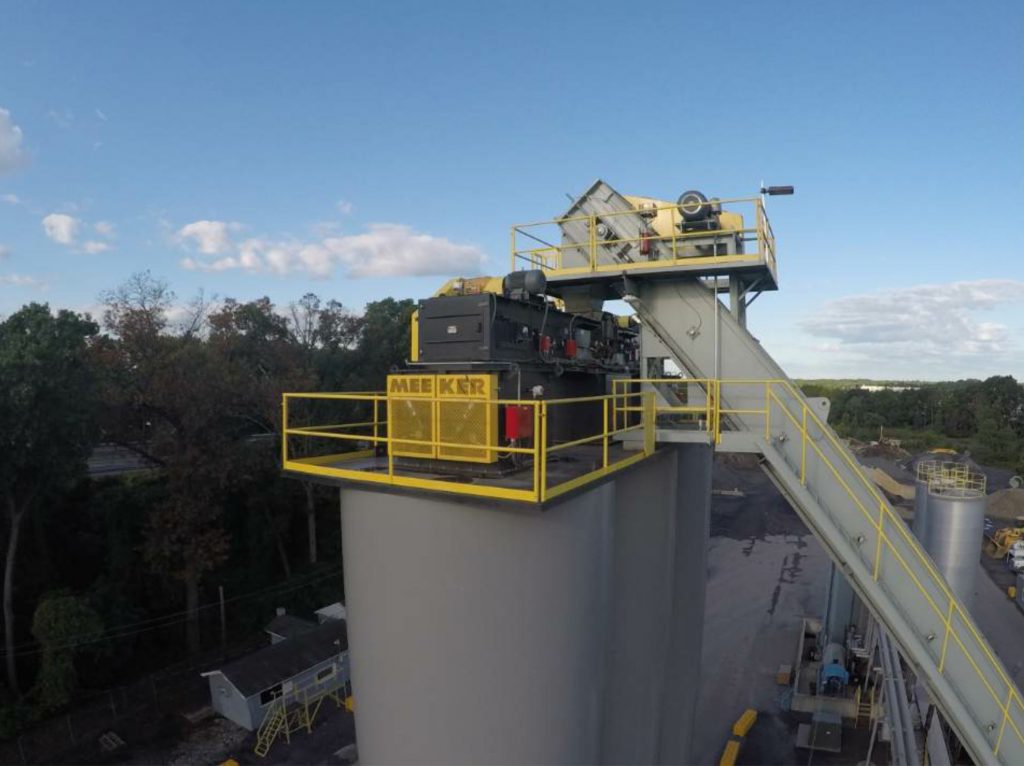
Moving between mixes and percentages is made easier with a new controls system instructing the components.
Having new controls in place also gives Interstate another tool toward its goal of being customer focused. Renzi explained that the plant is serving a good mix of customers doing everything from heavy highway work to utility patching in the area. At this time, about 40 percent of the business is from the parent construction company, but the team is looking outward for expansion.
“As new kids on the block, we know our competitors who have been doing this forever,” Renzi said. “We value those relationships on all fronts. We want to do jobs for a company or customer for many years to come. We want to build client relationships, as this is one of our key operation principals.”
Cardy explained how the new controls system factors into relationship-building for Interstate. “There are numerous areas where Generation3 helps with this mission.
Here are a few:
a. Generation3 has been touted as the most accurate system on the market, which provides Interstates’ customers with better mix quality.
b. Generation3 features a highly configurable design, so Interstate is able to tailor the software to the exacting needs of their clients.
c. Generation3 can be extended for GPS truck tracking, so customers have complete visibility of the fleet servicing their jobs as well as a web portal to their E-tickets.
d. Generation3 provides real-time transaction data for answering customer questions, such as the number of loads/tons that have been delivered to a job. In fact, using the Generation3 Web Services module, customers can instantly get answers to these questions from their phone or tablet, without needing to call the producer.”
Renzi spoke highly of the physical, equipment improvements that have taken place the past few years at the Runnemede site, but he also credits the Interstate team for the momentum, which is still going strong with a new lab facility under construction at this time.
“We have a good core group of people who have been with us since the beginning,” he said. “Our plant operator has been with us since 2016. He goes out of his way to help the customers. Some operators can be rigid, but our operator is customer-oriented. He understands the motto ‘we gotta be customer-friendly.’” If a contractor wants to start early, we’ll come in at 4 in the morning to get the mix ready for him. Or if someone has a job going late, we’ll stay late. Our team gets that.
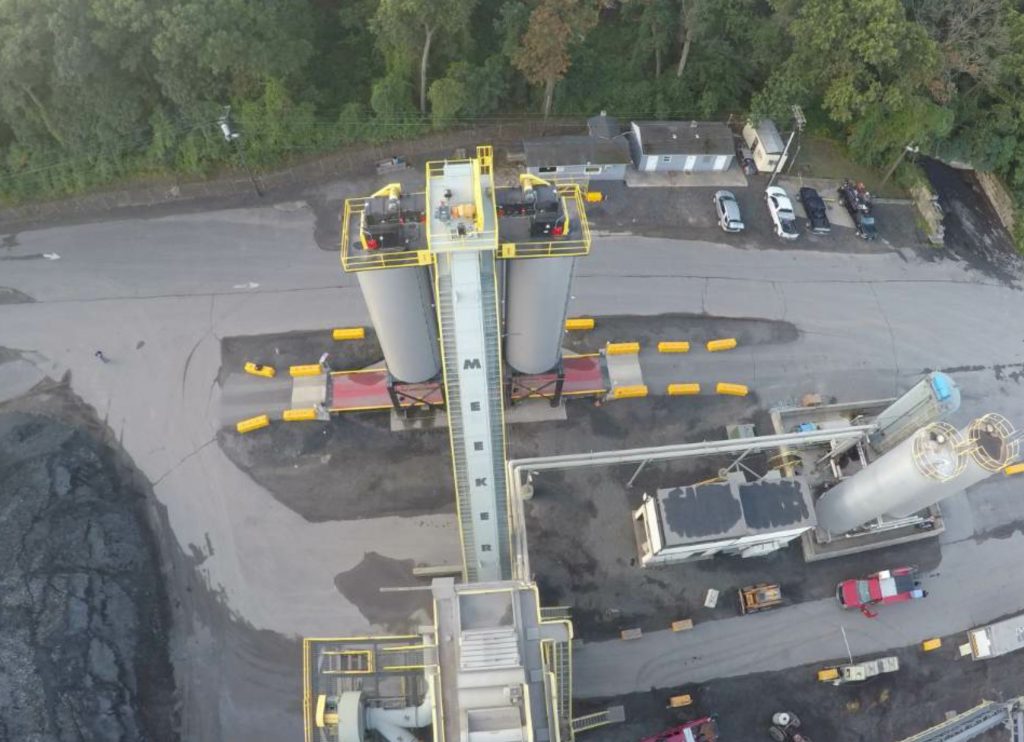
To get the Runnemede plant up to date with RAP use and good production, Meeker built a new system for Interstate and contacted Ken Cardy of Libra Systems Inc., Harleysville, Pennsylvania, to get new controls in place.
“The next key staff member is our plant superintendent/yard manager,” Renzi said. “When he came on board, he did everything. He has washed loaders, fed bins, controlled truck traffic, worked on the equipment side and took care of any maintenance that had to be done. These guys tackle a lot of the jobs around the plant themselves and our plant superintendent is no exception. He attended numerous training classes and picked Jeff’s brain every chance he got. He understands how to operate the plant now as well as the necessary maintenance, which is just as crucial to the plant’s successful operations; he can handle the technical and I.T. aspects of the plant.”
Interstate Asphalt fully encourages on-the-job training and promotes a culture where learning is rewarded. “This company understands the value of relationships and taking care of the people you have,” Renzi said. “You’re only as good as your people.” Having workers who are willing to ask questions and soak up knowledge of the industry brings the whole company forward.
“If you have someone who is eager to learn, you need to feed that,” Renzi advised. “You can’t put a dollar figure on that. Cultivate it. Give that person the leeway to make decisions and take pride in what they’re doing.”
Another member of the team that Renzi highlighted is the scale house operator. “She got her weigh master certificate and is the eyes and ears for Interstate. She’s the first person customers deal with on a daily basis.”
Our weigh master monitors loadout as one of her daily tasks, where she has a helping hand in the Libra Silo Safety System. Cardy explained the basic necessity of adding safety when adding silos, as Interstate did this summer: “For producers that place a priority on safety, a silo safety system is absolutely essential; especially for facilities with multiple silos. Equipment damage, personal injury, litigation and lost production are all consequences of a silo accident. The Libra Silo Safety System is designed to dramatically reduce these risks. It’s always on guard.”
For Interstate, the whole team is on guard for improvement and advancement in the market place. Renzi explained that when management initially met with Meeker about upgrading to serve the market place, “We spoke to Jeff about what improvements we want to make over time.”
“The silos were finished up over the summer for 2019 fall production,” Meeker said. “By August 2019, the plant is competitive with all plants in the market.”
Renzi agreed. “With the silos, now we can service the bigger jobs coming in and handle multiple clients. We have a flexibility we didn’t have before. All these improvements give us the flexibility to service more customers, operate more efficiently, and be more marketable.”
